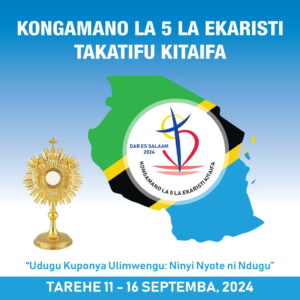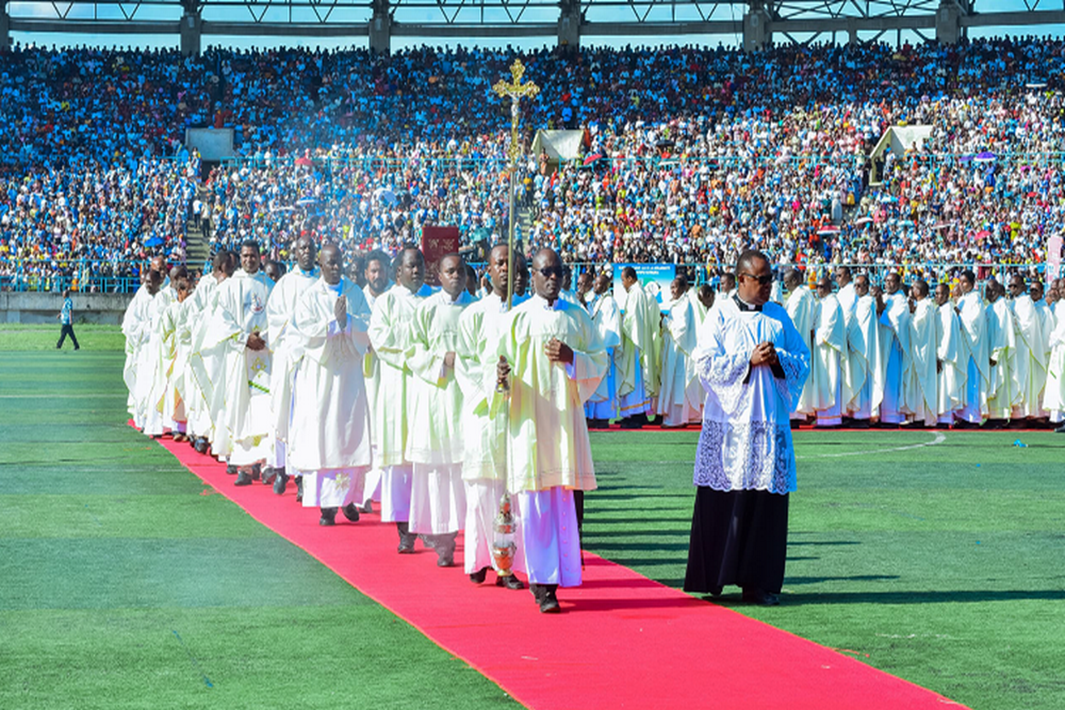By Wesley Omondi
DAR ES SALAAM, SEPTEMBER 24, 2024 (CISA)—Tanzania’s fifth National Eucharistic Congress took place in Dar Es Salaam From September 11 to 16, 2024, bringing together thousands of people under the theme, “Fraternity, Healing of the World: You Are All Brothers.” This significant event, held every four years, focused on the Church’s role in fostering unity, healing, and fraternity among people.
“Fraternity and healing are the most frequently used words, given the situation the nation faces today,” noted Rt Rev Method Paul Kilaini, Auxiliary Bishop Emeritus of the Catholic Diocese of Bukoba.
The Congress delved into seven critical topics related to the Eucharist, each touching on how Catholics can contribute to the healing of a wounded world. Rt Rev Simon Masondole, bishop of the Catholic Diocese of Bunda led the first discussion, emphasizing the solemnity of the Holy Mass. According to him, each celebration of the Mass is a sacred act, deserving careful and respectful preparation.
“Every celebration of the Mass is a unique act for its sanctity. It is our duty and obligation to celebrate it with deep respect,” said Bishop Masondole.
The theme of Christian fraternity was highlighted by Fr Joseph Mosha of the Catholic Archdiocese of Dar es Salaam, who underlined the importance of fraternity in upholding human dignity. He called upon Catholics to acknowledge this brotherhood, especially as they partake in the Eucharist, a sacred communion that makes Christ their brother.
“We must acknowledge and embrace Christian fraternity to heal the many wounds afflicting humanity,” stated Fr Mosha.
Fr Benno Kikudo of the Tanzania Episcopal Conference (TEC) spoke on integrating small Christian communities with the Eucharist. He argued that these communities should be Eucharistic, with Christ at the centre. He proposed strategic pastoral plans to strengthen families and communities, enabling them to live Eucharistic lives.
“Pastoral plans and strategies should be prepared and implemented with the goal of strengthening families, communities, youth groups, children, and mothers so they can live Eucharistic lives,” said Fr Kikudo.
Rt Rev Christopher Ndizeye, bishop of the Catholic Diocese of Kahama discussed the Eucharist’s role in moral living. He emphasized that accepting Christ through the Eucharist compels Catholics to live as Christ did, avoiding evil and embodying goodness.
“It would be blasphemous to receive the Eucharist and continue doing evil, as it would give the impression that Christ, whom we receive, leads us to do wrong,” warned Bishop Ndizeye.
Fr Rogasian Msaifi of the Catholic Archdiocese of Dar es Salaam addressed the need for healing within families through the Eucharist. He reiterated that Christ is the true healer and that families should seek and embrace Him as the source of healing.
One of the challenges discussed was the rise of Pentecostalism, addressed by Fr Leonard Maliva of the Catholic Diocese of Iringa. He noted that many people, seeking solutions to life’s difficulties, are drawn to sects that promise “miracles” but often leave them disillusioned and financially exploited. He called on the Catholic Church to create a strategic pastoral plan to address this issue.
“The Church must make a deliberate effort to identify and help those sons and daughters of the Church who have gone astray,” said Fr Maliva.
Concluding the congress, Bishop Kilaini reflected on the history of evangelization in Eastern Africa, highlighting the significant role the Church has played in the region’s development. He expressed concern over the current societal challenges in Tanzania, such as human rights violations and violence, calling for true healing through the Eucharist.
“True healing is found in Jesus of the Eucharist, who calls us to the table of dialogue and communion,” stated Bishop Kilaini.
